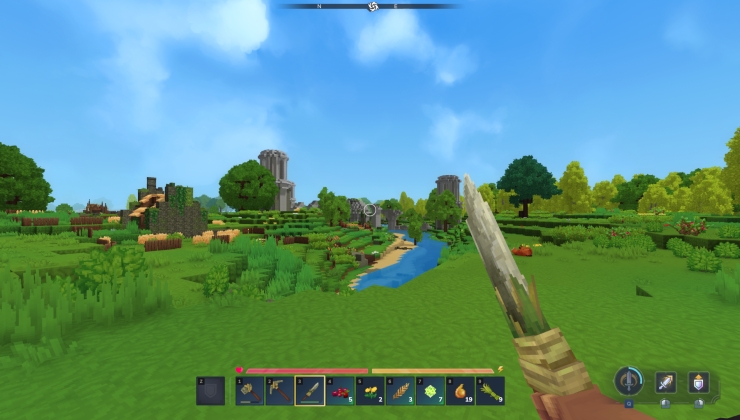There seems to be some confusion brewing on what games will actually run on the Steam Deck, so let this serve as a reminder on keeping expectations in check. Here's a quick refresher of how things are right now.
Some of the confusion seems to appear from an IGN interview, where Valve developer Pierre-Loup Griffais mentioned how "we haven't really found something that we could throw at this device that it couldn't handle" that we covered before. Here's the thing though: even though the Steam Deck will ship by default with the Arch Linux based SteamOS 3, they have also been testing Windows 10 and they've been working with AMD to get it supported on Windows 11 too. So speaking from a hardware standpoint, yes it probably will work with the vast majority of games on a performance level.
For regular readers and regular Linux gamers, knowing that the Steam Deck won't run everything is a given and this won't be news but there's plenty of people out there seemingly expecting a bit too much from it. Part of the problem though is Valve's marketing too, with it repeatedly mentioning your entire Steam library. They obviously want every game to work but that's simply not going to be the reality - at least not for a while.
For people who stick with SteamOS 3 this is where it doesn't quite match up. There's a good number of native Linux games (those actually built for Linux) and for everything else there's Steam Play Proton to run Windows games. A big majority of games work on Linux already between native and Proton but there's caveats.
Currently, Proton does not work with games that have the likes of Easy Anti-Cheat and BattlEye which is used in some of the most popular online titles. When it comes to EAC and BattlEye, we do know that Valve are working on it as they said in the developer documentation FAQ that they're "working with BattlEye and EAC to get support for Proton ahead of launch".
Another issue is Microsoft Media Foundation for videos, it's something of a nuisance and they don't play in Proton either. Currently Valve appear to be re-encoding the videos into a playable format which downloads with your game when run through Proton. That's a lot of work though too, there's a lot of games on Steam.
Then there's certain DRM too. Valve's older CEG (custom executable-generation) DRM also doesn't work in Proton, and there's no doubt a few other DRM/anti-tamper solutions that also don't work with Proton. Launchers can be a problem too, with some developers using .NET / Windows Presentation Foundation (WPF). For launchers Valve recommends that developers use something cross-platform and standalone like Qt or just skip launchers completely, which would be vastly better for gamepad/controller support too.
Compatibility will improve over time though as more developers hopefully look to support it directly and as Proton continues maturing. So even if your favourite or the latest AAA doesn't work right away, it might do later. There's still plenty of time until the Steam Deck releases and Valve has opened up requests for developer kits too. Valve also stated in their Steamworks video how "our goal is for every game to work by the time we ship Steam Deck" and that "there is a lot of work that has been done that doesn't yet affect the public version of Proton" so we are expecting the situation to improve. Until we see this special Proton release though, this article sums up the current situation.
If you're looking to try out Linux gaming and you're confused with Proton, be sure to check out our guide.
Quoting: EikeExactly, the 100% compatibility statement is for me a big PR error, the expectations will be high and the disapointment too...Quoting: GuestI do worry that the Deck was oversold on that idea of 100% comparability.This. People will be disappointed.
I am really skeptical about this situation improving so much with steam deck release, specially if Valve just use a plain arch Linux kernel.
Quoting: BielFPsI am really skeptical about this situation improving so much with steam deck releaseSame here, but Valve must have some substancial breakthrough that they didn't share, if they made such a bold claim. Otherwise, it doesn't make sense...
#fingerscrossed
Last edited by Mohandevir on 8 Sep 2021 at 2:18 pm UTC
Quoting: MohandevirSame here, but Valve must have some substancial breakthrough that they didn't share, if they made such a bold claim. Otherwise, it doesn't make sense...All I know is: If this statement is just PR then SteamOS is over, because a lot of people already think that this is just steam machines all over again, and I'm worry that if Steam deck fails, then it'll have a huge negative impact in the progress of games running on linux.
I don't know about anyone else, but I don't want to wait 10 more years to see some meaningful progress in that part.
Quoting: BielFPsNot even counting on the reputation of Valve that will suffer as much, if they don't deliver. That's why I can't believe that there is no backing to that statement.Quoting: MohandevirSame here, but Valve must have some substancial breakthrough that they didn't share, if they made such a bold claim. Otherwise, it doesn't make sense...All I know is: If this statement is just PR then SteamOS is over, because a lot of people already think that this is just steam machines all over again, and I'm worry that if Steam deck fails, then it'll have a huge negative impact in the progress of games running on linux.
I don't know about anyone else, but I don't want to wait 10 more years to see some meaningful progress in that part.
Quoting: MohandevirNot even counting on the reputation of Valve that will suffer as much, if they don't deliver.Valve reputation won't be affected outside the "hardware selling" part maybe, they are and will continue to be the biggest game store in the planet despite the results of steam deck.
The only thing that's actually in game here is the reputation of Linux systems running games for the average people, which is why this worries me...
Quoting: BielFPsValve reputation won't be affected outside the "hardware selling" part maybeYeah... I should have been clearer. That's what I was referring to. It could impact all of their other hardware projects, if they don't deliver or don't support the Steam Deck adquately. The Steam Link, Steam Controller and Steam Machines are already a sore spot for many Valve critics (even if debatable in some cases)... I don't think Valve wants to add the Steam Deck to that list.
Quoting: The_Aquabatbut but... what it matters the most, Does it run Crysis?:happy:I wonder what the butterfly effect would've done to Linux gaming nowadays if we could run Crysis on linux back in 2007
Quoting: MohandevirThey simply have their money and their stats. The top 100 games will run. That probably already covers 99% of active players. The Deck has a TPM. With this and money you can implement any AC.Quoting: BielFPsI am really skeptical about this situation improving so much with steam deck releaseSame here, but Valve must have some substancial breakthrough that they didn't share, if they made such a bold claim. Otherwise, it doesn't make sense...
They can easily register their TPMs with EAC and others. The AC then comes as a signed and closed kernel module for SteamOS. Problem solved.
Proton is only the open source part of the system. With the Steam Deck, a lot of software will be released that we haven't even seen yet. Valve has already pointed this out.
Last edited by 0aTT on 8 Sep 2021 at 3:25 pm UTC
With the "goal" to have every game of the steam catalog being able to run on the Steam Deck, I would understand it that I literally take the deck, as it is, and install any game from the Steam library, and it does work. No installing Windows, no further tinkering around.
Especially as they said, they have made progress with Proton that's not shipped to the public version of Proton. I would understand this as, yes, not all games work as of now with the public Proton version, but they will, when we release our currently much improved version.
But yeah, I see that this could all be taken as, we tested the hardware and all the games run with at least 30 FPS (on either windows or linux, with or without proton). Oof.
I am hyped for the device, as I do expect it to push Linux gaming also on the desktop a lot. Maybe this dream will go poof. Nice bummer to get back on the ground. Proton is still awesome, and Valve will work hard on getting things to run on it. Especially with selling hundred thousands if not even millions of devices. Then also publishers and developers will want to make sure their game runs on it. On the shipped OS. If not native, at least with Proton. It is still the biggest push ever for establishing Linux as a viable gaming platform.
Last edited by Corben on 8 Sep 2021 at 3:35 pm UTC
Quoting: 0aTTSorry for my ignorance, but could Valve push the "AC kernel module" with the Steam Linux client installation?Quoting: MohandevirThey simply have their money and their stats. The top 100 games will run. That probably already covers 99% of active players. The Deck has a TPM. With this and money you can implement any AC.Quoting: BielFPsI am really skeptical about this situation improving so much with steam deck releaseSame here, but Valve must have some substancial breakthrough that they didn't share, if they made such a bold claim. Otherwise, it doesn't make sense...
They can easily register their TPMs with EAC and others. The AC then comes as a signed and closed kernel module for SteamOS. Problem solved.
Proton is only the open source part of the system. With the Steam Deck, a lot of software will be released that we haven't even seen yet. Valve has already pointed this out.
That could make it available on any Linux installation (not just SteamOS)... No?
Last edited by Mohandevir on 8 Sep 2021 at 3:40 pm UTC
Quoting: MohandevirSorry for my ignorance, but could Valve push the "AC kernel module" with the Steam Linux client installation?Basically, of course, via DKMS, just like Nvidia does. I don't think that's Valve's preferred solution, because Valve itself doesn't believe in kernel-based AC. But they might be forced to do it.
That could make it available on any Linux installation (not just SteamOS)... No?
Whether they then make it available for the regular Proton certainly depends to some extent on whether the module can be released as open source. That would make it much easier.
Quoting: MohandevirSorry for my ignorance, but could Valve push the "AC kernel module" with the Steam Linux client installation?I don't think they want / can build the steam client with third party software, and in this case you're talking about pushing third party AC to users who won't play those games too.
That could make it available on any Linux installation (not just SteamOS)... No?
Anti Cheater software must be always bound only to the games using it, even VAC (Valve's Anti Cheat) only works for games using it, despite being from the same company of steam.
Quoting: BielFPsI don't think they want / can build the steam client with third party software, and in this case you're talking about pushing third party AC to users who won't play those games too.This is simply agreed to in the SteamOS 3.0 EULA and that's it. Nobody forces you to install it on your Linux PC. If you can get it to run at all under normal Proton, it will always be optional.
But games like Valorant will require a TPM in the future. Windows 11 will push that through. There is little Valve can do about it.
Last edited by 0aTT on 8 Sep 2021 at 4:20 pm UTC
They want customers to be able to install Windows on it, because that flexibility is a key selling point, and they have been testing the hardware with Windows, but they don't want people to actually do that. It's bad strategically for Valve, and a terrible user experience for their customers, if they have to.
The thing they'll have in mind when they say "your Steam library is available" is that those customers who've bought Windows-only games that don't currently work on SteamOS 3 will have bought them for their existing Windows PCs. The simple solution (definitely way easier than faffing about installing an OS) is to just turn that computer on. In Home Streaming is already built into the Steam client, and will work from the Deck. All your library, not the whole Steam catalogue.
They want everything to be able to run on the device itself. Both in terms of compatibility and in terms of performance. Their "good enough" for performance they've stated as 30 fps at the device's native resolution, but there isn't a "good enough" for compatibility; they are trying to demonstrate Linux as a viable gaming alternative to Windows. While they're asymptotically approaching full compatibility to identify the threshold that customers will feel is sufficient to not be reliant on Microsoft, they already have a solution built in to let the non-compatible games run. No extra work for customers, and they don't have to leave the Steam ecosystem.
Last edited by omer666 on 8 Sep 2021 at 4:24 pm UTC
Quoting: 0aTTThis is simply agreed to in the SteamOS 3.0 EULA and that's it. Nobody forces you to install it on your Linux PC. If you can get it to run at all under normal Proton, it will always be optional.You're talking about the EULA when you install a specific game that uses third party AC (and are shipped with it), which is different from Valve's pushing it out of the box with the steam client as @Mohandevir asked.
Quoting: 0aTTThey simply have their money and their stats. The top 100 games will run. That probably already covers 99% of active players. The Deck has a TPM. With this and money you can implement any AC.I hope the same thing. They can work on most played games and best sellers. I would add best rated (must-play) games too.
They can easily register their TPMs with EAC and others. The AC then comes as a signed and closed kernel module for SteamOS. Problem solved.
Proton is only the open source part of the system. With the Steam Deck, a lot of software will be released that we haven't even seen yet. Valve has already pointed this out.
Quoting: BielFPsOk. If I get it right, the module could be installed with the Steam runtime(?) for the specific game? I mean included into the game's specific "container system" that Valve is starting to implement?Quoting: MohandevirSorry for my ignorance, but could Valve push the "AC kernel module" with the Steam Linux client installation?I don't think they want / can build the steam client with third party software, and in this case you're talking about pushing third party AC to users who won't play those games too.
That could make it available on any Linux installation (not just SteamOS)... No?
Anti Cheater software must be always bound only to the games using it, even VAC (Valve's Anti Cheat) only works for games using it, despite being from the same company of steam.
Last edited by Mohandevir on 8 Sep 2021 at 4:49 pm UTC
1. Anti-cheat
2. Microsoft Media Foundation video bits
3. Old DRM, particularly Valve's own CEG, and launchers
4. Games that just have problems--various odds and ends and weirdities
Of those,
1. Is plausibly going to be fixed by launch. It better be. Time is running a bit short though, so they'd better have some internal stuff happening that they're not releasing yet.
2. Depends how fast their procedure is. A quick google suggests that there are around 50,000 games currently being sold on Steam. Let's imagine that 20,000 of those have MMF clips. If they can do their thing with 100 games per day, that's 200 days to fix them all. But probably only 50 days to fix the ones more than a handful of people ever currently play. That's pretty workable. If they can only fix 10 games per day, that's not so great. Mind you I suspect this vastly overestimates the amount of MMF clips or Proton would work on far fewer games than it already does.
3. You'd think Valve can fix letting its own technology work on Proton. So like, CEG, plausibly will work by launch. But there's a cluster of other technologies here, each pretty small, and the chance they'll get them all seems slim. But it may not matter that much if it's all old stuff that few people play.
4. Obviously they're not going to be able to fix all the little corner case problems by launch. If they can clean up the popular stuff that'll probably be good enough.
What I'm thinking is that some of the posts are a bit too pessimistic. Sure, I don't see Valve getting all games working on Proton by launch. But what we're ignoring is the vast gulf between the sales of Cyberpunk 2077 and the sales of Shovelware 0.8. There are masses of games on Steam that hardly anyone ever bought, or which are old and not one of the relatively few considered classics, that hardly anyone ever plays any more. Even games that are in their Indie way solid little successes, or were that three years ago, are nonexistent in terms of market share. It is plausible that 90% of people could find all the games they want to play on a Steam Deck work perfectly even if Valve fixed less than the top half of games on Steam, especially since a whole lot of games do already just work.
Bottom line: If they have anti-cheat nailed and do the videos for a lot of games including all the most popular and squash a good amount of general bugs, particularly in top-tier games, most people may not notice a problem even if technically there are still a lot of games that don't work well in Proton.
Last edited by Purple Library Guy on 8 Sep 2021 at 4:59 pm UTC











 How to setup OpenMW for modern Morrowind on Linux / SteamOS and Steam Deck
How to setup OpenMW for modern Morrowind on Linux / SteamOS and Steam Deck How to install Hollow Knight: Silksong mods on Linux, SteamOS and Steam Deck
How to install Hollow Knight: Silksong mods on Linux, SteamOS and Steam Deck